|
 Become
a fan on Facebook
Become
a fan on Facebook  Follow
on Twitter Follow
on Twitter
Article by Mark Dujsik | December 30,
2012
Here
are the ten best films of 2012:
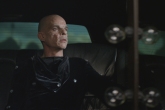 10.
Holy Motors 10.
Holy Motors
I
cannot tell you what Holy Motors
"means;" I can only theorize as to what it is "about." I can barely explain to you why it works as well it does, but at least it
is fairly easy to describe. Denis Lavant, in a brilliantly chameleonic performance, plays a man
without an identity who spends the course of his day transforming into a variety
of characters whose lives resemble various movie scenarios—a gangster story, a
musical, a deathbed scene, a father-daughter conversation, etc. Director Leos Carax, who serves as our key to the surrealistic adventures
that follow in a prologue in which he literally gives the audience the middle
finger, explores identity, cliché, the art of performance, and how and why we
watch movies—not to mention questioning if that is a worthy endeavor in the
first place. Perhaps Carax identifies the film itself with its central character, and
the reason for its creation is as simple as the man's reason for performing
without an audience: for the beauty of it. Whatever it is, the film has a "je
ne sais quoi l'enfer" quality, and a multitude of pleasures abound if
one gives into the insane spell the film casts.
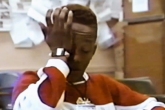 9.
The Central Park Five 9.
The Central Park Five
"We're
not very good people, and we're often not," says a historian—one of the
handful of insightful interview subjects that help put this story of gross
injustice into context—near the end of The
Central Park Five.
It's a brutally cynical statement, but that does not make it any less
correct. After watching how corrupt police work, lazy journalists, cowardly
politicians and public figures, and a citizenry brimming with racial prejudices
just below the surface—all of them—help to contribute to the railroading of
five teenagers for the rape and assault of a woman in Central Park, it becomes
clear that one of the greatest offenses of this case is that people simply do
not care when the system and all of its components get it wrong. Directors Ken and Sarah Burns and David McMahon have taken a local crime
and the resulting miscarriage of justice and given it the weight of human
tragedy. They interview the five teenagers—now in their late 30s—about their
ordeal, from being forced into false confessions to the difficulty of
readjusting to life after prison. This is, at times, a devastating film—one that refuses to buy into an
easy answer.
 8.
Looper 8.
Looper
Writer/director
Rian Johnson is fully aware of the cerebellum-fusing paradoxes inherent in time
travel, and Looper dismisses any
long-winded explanation of the specifics of its system before it can even begin.
The rules here are simple: Time travel exists, and this is how people use it. More importantly, Johnson is concerned with the
repercussions. This is not just a story about time travel; the film takes familiar
elements and finds exciting and innovative ways to challenge our expectations of
them. A criminal organization with access to a time machine sends people it
wants killed back 30 years, where a "looper" kills them. Joe (Joseph Gordon-Levitt) is one of those loopers and, as is required of
everyone in his profession, has to kill his future self (Bruce Willis) to
"close his loop." The film contains the seemingly prerequisite chase and shootout sequences
as Joe tracks his older self and Old Joe hunts the leader of the syndicate that
will betray him (at the time, still a child, played by Pierce Gagnon, and living
with his mother, played by Emily Blunt, on a farm), but Johnson holds the
disparate elements together with his insistence that we actively consider the
film's moral conundrums.
 7.
The Deep Blue Sea 7.
The Deep Blue Sea
Poor
Hester Collyer (Rachel Weisz, full of agony and beauty) begins The Deep Blue
Sea turning on the gas furnace in her small apartment and forgoing the
lighting of it. She is in misery—and little wonder, as we discover over the course of
this sad, lonely tale. The man she loves, a World War II veteran named Freddie (Tom Hiddleston)
with difficulty connecting to people, has become distant toward her. Her husband (Simon Russell Beale), a kind and gracious judge, is willing
to forgive her and wants her to return to their marriage, but she does not love
him. The heart wants what it wants; it's anyone's guess why that might be. That is the simple yet great mystery at the heart of this story, adapted
from the Terence Rattigan play by writer/director Terence Davies. It concerns three people who may or may not love another person, although
we cannot even take their word on the matter. They are too emotionally unreliable or unavailable to be honest or aware
of it. Like Hester, the film is content to be lost in time; it is an
old-fashioned melodrama with gorgeous soft-focus cinematography by Florian
Hoffmeister, vivid performances, and a narrative that effortlessly weaves the
past and present to devastating effect.
 6.
The Perks of Being a
Wallflower 6.
The Perks of Being a
Wallflower
People
will take what they want from The Perks of
Being a Wallflower, director Stephen Chbosky's lovely and nostalgic
adaptation of his novel, which is set in the early 1990s, based on the author's
own experiences a decade prior, but, in film form, might as well be set today. They will identify with this character or that one; they will recall
similar feelings of anguish or longing and, perhaps, the few spots of
unmitigated joy—a time that they felt, as protagonist Charlie (Logan Lerman)
puts it, "infinite." Charlie is lost—an outsider with a painful past—and simply wants to
be found. He becomes friends with Patrick (Ezra Miller) and Sam (Emma Watson),
step-siblings who are also on the fringes of high school society but do a better
job putting on a sunny public face than their new friend. Chbosky has tapped into something mysterious and intangible—a feeling
of familiarity toward these events, this place, and the people within them—and
the result is a film that is as universal as it is specific to these characters
and how they try their best against forces they cannot control. The film is a particularly lucid, emotional time capsule of the strain of
adolescence, yet hope burns brightly in there, too.
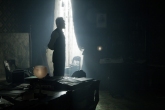 5.
Lincoln 5.
Lincoln
Tony
Kushner's screenplay for Lincoln is
somehow both deeply idealistic and cynical about the operation of government. The cause at the heart of the story is the passage of the Thirteenth
Amendment to the Constitution, which would end of slavery in the United States,
in the House of Representatives; it is unquestionably righteous. The means to that end involve doling out of patronage jobs to win the
votes of lame duck politicians, brokering a peace deal with the Confederacy and
keeping it secret to maintain the illusion that the Civil War will only cease
with the death of slavery, and lying to Congress. These are far more
questionable. It's all part of an attempt to bring Abraham Lincoln (Daniel Day-Lewis,
uncanny in the role) back down to earth; here is Lincoln, the man and, above
all, the politician. He is soft-spoken and always ready with a story to ease the nerves or
calm the tempers of those around him. Politically, he is at odds with everyone, from his Cabinet, who believe
he has stretched the power of the executive branch too far, to progressive
members of the Republican Party, who feel Lincoln has been too lax in matters of
abolition. Director Steven Spielberg is as apt at presenting the debates and
maneuvering as he is exploring the internal conflicts of men who do not have the
benefit of history.
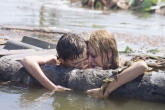 4.
The Impossible 4.
The Impossible
In
detailing the true story of a vacationing family that is caught up in the
ravages of the 2004 tsunami in southern Asia, director J.A. Bayona gives us a
virtuoso sequence of controlled chaos. The centerpiece of The Impossible
follows Maria (Naomi Watts) and her eldest son Lucas (Tom Holland) as they are
swept away through raging waters filled with punishing debris. The film does not shy away from that story of utter devastation, but it
derives its power from the basic kindness and decency of people in the midst of
senseless tragedy, like Lucas trying to reunite families in an overrun hospital
or his father Henry (Ewan McGregor), who is separated from them, encountering a
man willing to share his dying cell phone. This is a harrowing and emotionally stirring film about survival—a
relatively hopeful part of the larger tragedy. Bayona and screenwriter Sergio G. Sánchez put the story in proper
context by subverting the film's emotional progression. Just as the path of the story seems set in stone, the film begins
balancing the narrative of the family with that of those in the background who
are far less fortunate. It's a sort of intentional cognitive dissonance that focuses more on what
has been left behind. This single episode in the greater and far more despairing story may help
stay sane in the face of devastating calamity, but the film knows it could never
make sense of something so horrible.
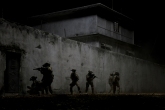 3.
Zero Dark Thirty 3.
Zero Dark Thirty
Whatever
the so-called "War on Terror" is, this is the defining film about it. After establishing the stakes of the almost-decade-long hunt for Osama
bin Laden with a haunting portrayal of the attacks of September 11, 2001, Zero
Dark Thirty immediately and with little preparation throws us into the murky
waters of the ensuing operation with a sequence focused on the use of
"enhanced interrogation techniques" (known as "torture" in
normal circles) on detainees with suspected terrorist ties. Our surrogate in that moment is Maya (Jessica Chastain in a fascinating
performance of growing obsession), a new CIA operative who winces at the tough
treatment of a man who insists he knows nothing. As times passes through a long slog of intelligence-gathering with no
results and attacks unfolding throughout the world, screenwriter Mark Boal
ensures that we understand the evolving nature of the characters as well as how
changing public and political attitudes affect the techniques the operatives
use; his screenplay has the objectivity and precision of a rigorous journalist. Director Kathryn Bigelow's tone is clinical as year after helpless and
hopeless year passes, but she never loses sight of the human toll, either. As the film approaches the climactic raid on the complex where bin Laden
is hiding in relative comfort, it effortlessly conveys the weight of history,
and as the helicopters taking members of SEAL Team Six to their objective make
their long flight, the sense of catharsis is overwhelming.
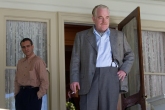 2.
The Master 2.
The Master
Despite its intricate external trappings (the inspiration—impossible to ignore
or deny—of L. Ron Hubbard and his post-war self-help program that would
eventually become the Church of Scientology upon the titular character and his
own methods, the imperceptible playing with time, the use of strange jargon to
hint at an uncertain philosophy behind the methods on display), there is no
great puzzle to the meaning of The Master.
It is simply, profoundly about that intangible quality of
individuality—what it means and takes to be one's own man and whether or not
it is even possible to be free (If one is looking for some easy resolution to
that quandary, then I can only wish that person good luck). At the film's center is a man who, by all appearances, is
free. After leaving the military at the end of World War II, Freddie Quell
(Joaquin Phoenix) is a rover, taking whatever job he can find and failing
miserably at all of them, until he meets Lancaster Dodd (Philip Seymour
Hoffman), the charismatic leader of a program called "The Cause."
Freddie is not free. At the start,
he is obsessed with sex; he later transfers that obsession to Dodd's system. For Dodd, Freddie is a promise; success in transforming him would mean a
total validation of everything in which Dodd believes. Writer/director Paul Thomas Anderson refuses to take sides and only
weighs the options of what the characters represent. Phoenix and Hoffman's towering performances help elevate this character
to devastating heights as their characters' struggle for dominance becomes a
fight for a man's soul.
 1.
Beasts of the Southern
Wild 1.
Beasts of the Southern
Wild
No film this year
filled my heart with such joy and woe more than Benh Zeitlin's debut feature
film. Beasts
of the Southern Wild, the best
film of 2012, brings us into a unique place, where we are able to observe
and, more importantly, empathize with the nearly infinite melancholy of its
inhabitants while admiring their endless—some might say reckless—resilience
in the face of so much ecological and personal devastation. The film casts non-professional actors to great effect in bringing to
life "the Bathtub," a small community that apparently sits somewhere
in southern Louisiana. The central
character is Hushpuppy (Quvenzhané Wallis), a 6-year-old girl who lives in a
trailer adjacent to the shack where her terminally ill father Wink (Dwight
Howard), whose behavior towards his daughter sometimes crosses into abuse as he
tries to prepare her for a life on her own (He tries to calm her fears of a
storm by howling at it like Lear—but
with a shotgun), resides. A storm hits the region, leaving the remaining residents of the Bathtub
to fend for themselves in the face of massive flooding.
Two things help tie the story together: Hushpuppy's impeccably worded narration,
which juxtaposes the maturity of her thoughts with the naïve language she uses
to articulate them, and the unstoppable approach of aurochs, giant creatures
awakened by the melting polar ice caps that either symbolize uncaring chaos of
life or exist in reality (or both). The
result of all the pieces is a film of dreamlike naturalism—an approach that
possesses a keen awareness of the longings and fears of its main character while
still maintaining a firm grasp of the severity of the locale and the complexity
of its central relationship.
Honorable Mention:
The
Dark Knight Rises,
Django
Unchained, Headhunters,
ParaNorman,
Ruby
Sparks, Searching
for Sugar Man, Seven
Psychopaths, Silent
House, Silver
Linings Playbook,
Skyfall
Copyright © 2012 by Mark Dujsik. All
rights reserved.
 Back
to Home Back
to Home
|
Buy Related Products

|
